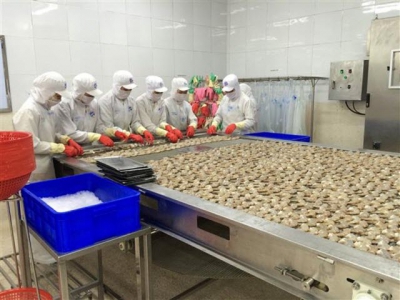How does the US-China trade war affect Vietnamese seafood?

According to the Vietnam Association of Seafood Exporters and Producers (VASEP), the US-China trade war will have a direct impact on the economies of the world, including Vietnam. The US is the third largest shrimp import market of Vietnam, so it is certain that shrimp products will be affected by this event.
Shrimp processing for export. Photo: N.Hue
Opportunity to expand market share
According to Vietnam Customs, China is the fourth largest shrimp import market of Vietnam, accounting for 15% of Vietnam's total shrimp export value to all markets. In the first six months of this year, shrimp exports to China reached 245.6 million USD, down 13.2% over the same period last year.
Meanwhile, the US was identified as Vietnam's third largest shrimp importer, accounting for 15.6% of Vietnam's total shrimp export value. In the first six months of this year, the shrimp exports to the US reached 255.7 million USD, down 7.5% over the same period last year. Vietnam is the fifth largest shrimp supplier to the United States, accounting for 8.5% of total US shrimp imports.
Up to May this year, imports of shrimp from Vietnam into the United States reached 17,900 tons, valued at 202.6 million USD, down 3% in volume, but up 2% in value.
The trade war is the reason that the US and China have increased import tax rates, so the trade flow of shrimp between US and China has slowed down. Countries supplying shrimp to China, such as Canada, Russia, Australia, and New Zealand, and shrimp suppliers to the United States, such as Indonesia, Thailand, Mexico, Brazil and Vietnam, will gain the benefits.
Currently, the US still applies a 0% tariff on HS codes, 03061700, 16052110, 16052910 on products imported from China, and 5% on product HS codes, 16052105, 16052905.
However, the US$ 200 billion US tariff package is expected to impose duties on Chinese goods, including furniture, agricultural products and seafood. Accordingly, the United States will impose a 10% tax on Chinese shrimp products, including HS codes, 03061700, 16052105, 16052110, 16052905, 16052910. These are also strong products for Vietnam in the US market.
These products are able to compete on price and tax rates with China in the US market. Therefore, this can be considered as an advantage for Vietnam when increasing exports of these goods to the US. Moreover, Vietnam shrimp has a certain position with US consumers, so when the supply from China drops, US importers will choose Vietnam as an alternative supply.
Actively overcome the challenge
Due to the high tax on exports to the US, China will also have to reduce the imports of raw shrimp for processing and re-export. This may affect the export of Vietnamese raw shrimp to the Chinese market. Meanwhile, imports of fresh, live and frozen raw shrimp accounted for 94% of total shrimp exported to China in 2017.
According to VASEP, in the context of the trade war, both the US and China are suspicious of each other, so they will set more stringent technical barriers to Vietnam when exporting shrimp to both markets. The United States will closely examine the origin of shrimp from Vietnam. However, this is also an opportunity for Vietnamese enterprises to affirm their position, improve the quality and transparency of the origin of products to be able to gain market share from China in the US market.
In addition, the US-China trade war will increase the pressure on production costs for enterprises when exchange rates fluctuate, and the potential export depreciation in the Chinese market, for the role of supplying raw materials to produce finished products and export to the US.
The trade war has been unpredictable and its impact is questionable. Shrimp exporting enterprises should consider this as an opportunity to affirm their own position, including improving the quality of products, enhancing their pro-activeness in trade, and taking advantage of signed FTAs.
The enterprises also need to actively update on the list of US and Chinese taxable items, as well as for any occurrences of rising exchange rates between the Dollar and Yuan, so as to be able to respond in a timely manner.
Related news
 Kiên Giang has ambitious plans for industrial shrimp farming
Kiên Giang has ambitious plans for industrial shrimp farming The Cửu Long (Mekong) Delta province of Kiên Giang has 2,000ha of industrial and semi-industrial shrimp farming models, or 79 percent of its target for the year
 Shrimp value chain for sustainable development
Shrimp value chain for sustainable development The linkage among shrimp farmers, producers and seafood exporters does indeed play an important role in the sustainable development of Vietnam’s seafood industr
 Vietnamese shrimp exports to the US may benefit from US-China trade conflict
Vietnamese shrimp exports to the US may benefit from US-China trade conflict Vietnamese shrimp have established a certain position in the US market, thus US importers will be likely to choose Vietnam as an alternative source